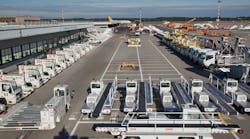With air travel almost halted at Miami International Airport during the coronavirus pandemic, airlines, shops, restaurants and other businesses are pushing Miami-Dade to waive $65 million worth of rent through May. Workers want some of that relief, too, and are asking county commissioners to make some airport tenants continue to provide health insurance for laid-off employees.
The competing demands set up the first big legislative fight in Miami-Dade during the pandemic, as influential airport vendors push the airport to suspend minimum rent requirements and union allies try to wring a concession out of the package.
The showdown is slated to unfold Tuesday at the County Commission’s first online meeting, with board members participating remotely and members of the public speaking up electronically.
“Normally we have a sea of workers in the chambers,” said Wendi Walsh, secretary and treasurer of the local Unite Here chapter that represents airport employees in Miami-Dade. Commissioners “have to look them in the eyes when they decide what to do.”
To participate in the 9:30 a.m. meeting, members of the public are invited to call 305-376-5777 to speak for up to two minutes on agenda items, or participate through the Zoom online meeting application. People who registered in advance were also able to submit email and voicemails to be read or played at the start of the meeting.
The meeting will also give members of the public their first chance to speak to elected officials about a string of emergency orders issued since March 16 by Mayor Carlos Gimenez that have shuttered businesses, parks, beaches, marinas and senior centers, and restricted public gatherings to fewer than 10 people.
Gimenez must present the orders to commissioners for ratification, and this is the first meeting since the mayor declared a state of emergency March 12 over the spread of COVID-19.
The airport item calls for a “Financial Relief Plan” for MIA tenants, including rental-car companies, luggage wrappers, and duty-free outlets. Federal aviation rules bar airports from suspending fees for airlines, so the plan would delay the due dates for about $10 million a month owed in rent by American and other carriers. That money would come due Sept. 30 for airlines who requested deferrals.
For the other tenants, most rent would be waived, said Lester Sola, the county’s aviation director. Tenants typically owe two levels of rent. One is a flat amount, known as the minimum guaranteed rent. The other is a percentage of sales, typically 15 percent, that’s owed only if it’s higher than the minimum amount. The minimum payments equal more than $11 million a month.
Under the administration’s relief plan, MIA would waive the minimum portion of the rent and retain the percentage requirement, allowing tenants to pay a tiny fraction of what they would owe given the collapse in airport traffic.
“They aren’t selling anything,” Sola said. “We went from 120,000 passengers a day to 10,000.”
He said a small number of restaurants and stores do continue to operate in terminals that remain open for the drastically reduced flights that continue to fly in and out of Miami. Passenger traffic is down between 80 and 90 percent. Flights are down from 1,000 a day to 200, Sola said.
Some MIA tenants are fighting the plan by Commissioner Eileen Higgins to require extended health benefits for laid-off workers as a condition for the relief. Her plan requires recipients to continue providing coverage or continue paying employees the same dollar amount they were receiving in employee-provided insurance contributions.
“Our county is a place where we support businesses and we support workers,” Higgins said. “What I don’t want to see is employees who were working on county property fall into ranks of the uninsured and add to the burden of our safety-net hospitals.”
Higgins said the insurance costs would reduce the rent relief by about 10 percent for most tenants.
The MIA plan, sponsored by Commissioner Rebeca Sosa, does not include financial disclosure requirements that would reveal how much cash may have accumulated on tenants’ books that could cover extended insurance costs.
Walsh said about 2,000 laid-off workers won’t have insurance without the relief.
“I think making sure these companies survive is the right thing to do,” Walsh said. “Our main concern is that a small portion of this takes care of those hourly employees.”
With Florida’s unemployment system overloaded, Walsh said Unite Here isn’t aware of a single displaced worker who has received a check from the state. Walsh said covering their own insurance would cost workers between $450 and $1,400 a month. Workers received no severance from MIA employers, she said.
Some Unite Here members have already submitted their comments to the commission through voicemail messages, and Walsh provided transcripts from two laid-off workers.
“Honestly, health insurance is something I need to survive,” said Maria Rodriguez, 55, who worked at Wendy’s in MIA and was laid off March 26. “My husband and my son are both covered under my plan. If I lose my health insurance, they lose it too. ... I don’t know what I’m going to do.”
———
©2020 Miami Herald
Visit Miami Herald at www.miamiherald.com
Distributed by Tribune Content Agency, LLC.

